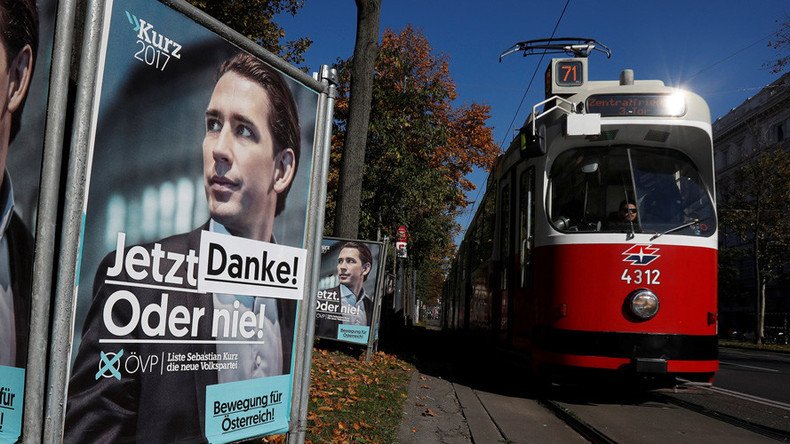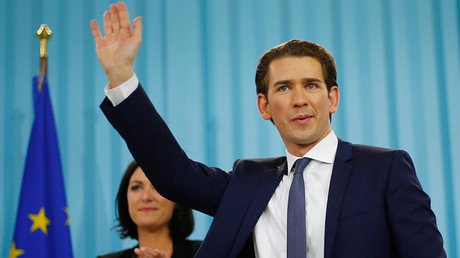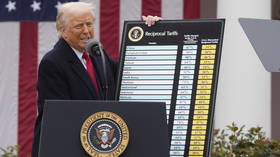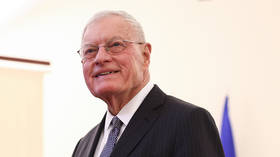Austria and the onward march of the far-right

This weekend’s Austrian general election result maintained a steady trend we’ve seen across Europe in recent years, namely significant gains for right-leaning parties and reverses for the established parties of the left and center-left.
In Austria, the 31-year-old Wunderwuzzi’ Sebastian Kurz is poised to become the world’s youngest leader, having led his conservative People’s Party (OVP) to a clear lead in the election with 31.5 percent of the vote.
The radical nationalist grouping, the FPO (Freedom Party) nearly defeated the Social Democrats (SPO), which received 26.9 percent to FPO’s 26 percent.
The SPO collapse is all the more striking when you consider just how dominant the party was in the 1970s and 80s. In three elections, 1971, 1975 and 1979 it achieved 50 percent or more of the vote. It was in power continually between 1970 and 1999. But since 2008, its support in elections hasn’t reached 30 percent.
It’s a similar story of decline for most other leading European parties of the left/center-left. In Germany, the SPD slumped to its lowest share of the vote since World War II in last month’s elections, registering a measly 20.5 percent. In this year’s French Presidential elections, the Socialist candidate, Benoit Hamon, pulled just 6.2 percent in the first round - the first time the party’s candidate hadn’t come in the first three.
In Spain, the Socialists slumped to just 22.0 percent in the 2015 elections - their worst showing since democracy returned to the country after General Franco. In last year’s poll, they did improve on that, but only by 0.6 percent. Compare that to the 48.1 percent they registered back in 1982, or even the 43.9 percent they got as late as March 2008.
In Hungary, Viktor Orban has been in power since 2010. Bulgaria is governed by the center-right GERB party in coalition with a nationalist alliance. In Poland, the national-conservative Law and Justice Party rule the roost.
In Spain, the conservative People’s Party has held office since 2011. Belgium has been ruled by a center-right coalition since 2014, in The Netherlands, the center-right has led an alliance since 2010 (and in this year‘s election Geert Wilder’s ultra-nationalist Party of Freedom made gains to finish second). In Britain, the Conservatives have been in power for over seven years. In Norway, previously a bastion of social democracy, the center-right coalition won a historic re-election last month.
The trend has even gone Transatlantic with the victory of Donald Trump.
How to explain right-wing resurgence?
If we go back in time to around the Millennium, things looked very different. Then it was the parties of the left/center-left who were in the ascendancy and right-wingers who were in the doldrums.
Speaking at the Labour Party conference in 1999, Prime Minister Tony Blair - the grinning poster boy of the ‘modernized’ center-left, looked ahead to a new century of ‘progressive politics’ liberated from ‘the forces of conservatism.'
Mainstream parties like Labour, the ‘experts’ told us, had done the right thing by jettisoning ‘old-fashioned’ socialism and accepting neo-liberal globalization and support for US-led wars. By learning to love Goldman Sachs, hedge fund magnates, and Starbucksification, and promoting liberal social policies instead of left-wing economic policies, they would be assured of a bright electoral future. But it was all balderdash. The good electoral showing of New Labour and its continental clones in the early noughties was deceptive.
New Labour won elections on historically low turnouts. In 2001, for instance, the turnout in the general election was just 59.4 percent - the lowest since 1918.
People may have regarded these ‘reformed’ capital-friendly, center-left parties as the lesser of two evils while the economy seemed to be performing satisfactorily, but the financial crash of 2008, and the relatively large spike in migration across Europe (caused by people fleeing Middle Eastern/North African neocon wars and free movement within an enlarged EU), totally changed the dynamic. The immigration issue became a godsend for the parties of the right (and particularly the radical right), allowing them to play on people‘s fears that migrants were taking their jobs.
There was also a more profound unease which helped the right, namely the pace of change in recent years had been too great for many people.
Ruling parties of the center-left failed to respond adequately to the change in the public mood. The crash of 2008, brought about by the greed of a section of the financial elite, should have seen a socialist resurgence, but instead mainstream parties of the left, wedded to Blairite solutions, were increasingly seen by ordinary voters as out-of-touch, and in some cases, utterly mendacious.
In Hungary, people took to the streets after ‘Socialist’ Prime Minister Ferenc Gyurcsany, a disciple of Tony Blair, was overheard on a leaked tape admitting that his government had ‘lied in the morning, lied in the evening’ to win the election.
Gyurcsany refused to resign, but for the MSZP the damage was done. The party slumped to just 19.30 percent in the 2010 election from a 43.21 percent share of the vote in 2006. Working-class voters in deprived areas deserted the pro-austerity, pro-privatization ‘Socialists’ in droves, with many ending up voting for the radical nationalist grouping Jobbik, which is now, according to the polls, Hungary’s second most popular party.
When people did turn to the left wing and nominally socialist candidates to end austerity, post-2008, they’ve tended to be let down- further damaging the left’s long-term prospects. In France, in 2012 voters gave Francois Hollande the benefit of the doubt, but, as I highlighted in a previous OpEdge, just a year after his election the man who had pledged to end austerity was pushing through a fresh round of cuts. While in Greece, SYRIZA’s popularity ratings have slumped to around 20 percent.
A rare example of a leftist government managing to cut the deficit while maintaining public support has been in Portugal, where a minority center-left government, supported by the radical left, has been in power since 2015.
Overall though, the left is in a very bad place, prompting the question: is there any way back?
The 2008 financial crash, brought about mainly by the greed and recklessness of very wealthy bankers, ought to have been a great opportunity for the political left. But...
British academics Simon Winlow, Steve Hall and James Treadwell argue the genuine left must break with the liberal-left. It was the liberalization of the left and the focus turning away from bread and butter economic issues and onto cultural ones that led to the rise of the right. To regain electoral support, the left ‘must work tirelessly to reattach itself to its roots in the working-class,’ and stop indulging in identity politics and futile culture wars which don’t interest people struggling to make ends meet.
The Greek writer Takis Fotopoulos says that right-wing nationalist parties have often appeared to be more concerned with people’s everyday concerns than so-called 'progressives.' Too often these have been seen as siding with the establishment, featherbedded Eurocrats and the unelected global elites, and not with the people they were meant to represent.
What the modern left could learn from Austria's 'sun king' Bruno Kreisky - interesting piece by Neil Clark http://t.co/pJSihKy via @guardian
— Philip Oltermann (@philipoltermann) January 21, 2011
The left, across Europe, can also learn a lot from Austria and why the SPO was so popular in the 70s and 80s. The party’s leader at this time was a fearless politician called Bruno Kreisky, who as I wrote here in The Guardian, was a true man of the people.
‘The Red Chancellor’ made no apologies for his socialism and Austrians responded by repeatedly giving him the electoral mandate he asked for.
Kreisky, who in addition to adopting populist majoritarian policies at home, pursued a genuinely progressive foreign policy too supporting détente between east and west. He would be heartbroken to see what has become of the European left today and how poorly parties that were once so dominant are now faring.
Parties like Austria’s SPO moved away from ‘Kreiskyite’ positions and embraced pro-establishment ones, and the results have generally been catastrophic.
Which brings us to UK Labour. All the smug, mutually-adoring Inside the Tent experts predicted the election of the veteran anti-war left-winger Jeremy Corbyn as leader in 2015 would prove disastrous for Labour’s electoral prospects. In fact, the very opposite has occurred.
"Labour might drop below 20 per cent and stay there. There will be ashes but perhaps no phoenix." - Philip Collins in The Times
— Benedict Rogers (@benedictrogers) January 27, 2017
Labour bucked the continental trend by winning 40 percent of the vote in this year’s general election, its biggest increase in vote share since 1945. The party did so well precisely because it broke with Blairism, and adopted more populist positions with its election slogan being ‘For the Many Not the Few.' Its program was also criticized as being wanting to take Britain "back to the seventies," but this too helped it win votes from those nostalgic for the more straightforward and less stressful pre-globalization era.
The pressure on Labour to "moderate" has been, and continues to be, intense, but as we look around Europe and survey the electoral debris, it’s clear that moving back to the ‘center,' would be absolutely the worst thing for Labour to do. But while the party’s made great progress under Corbyn, things could still go either way. Labour has a very strong ‘moderate’ wing which we saw again recently with Mayor of London Sadiq Khan’s gushing over Hillary Clinton, the woman who, loved by the virtue-signaling liberal elites, lost the Rust Belt to Trump in last year’s US presidential election.
Will the left learn from their mistakes?
Or will they carry on fighting culture wars and allow the right to carry on winning elections?
Follow Neil Clark @NeilClark66
The statements, views and opinions expressed in this column are solely those of the author and do not necessarily represent those of RT.
















